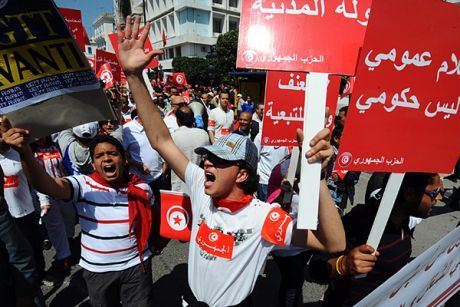News
You are here
Tunisia: 'The people want another revolution'

December 14, 2012
The general strike that was supposed to take place in Tunisia yesterday was called off, following a last-minute deal between the government and the leadership of Tunisia’s General Labour Union (UGTT). The union’s executive had called the strike in response to attacks on its members and offices in recent weeks, which the union says were carried out by the League for the Protection of the Revolution, a paramilitary group with connections to the governing Islamist party, Ennahda. The call also followed a growing number of anti-government strikes and protests across Tunisia.
The deal was struck just in time to avert a nationwide strike, which would have been the third in the union’s history since the 1940s. The second came almost two years ago during the Tunisian Revolution, and played a key role in toppling the government of decades-long dictator Zine El Abidine Ben Ali, who fled to Saudi Arabia.
The union leadership agreed to call off the strike in exchange for four demands, which the government conceded: that the government protect and defend freedom of speech, expression, assembly and association, including trade unionism and political activism; that the government promise to address all grievances raised in recent discussions; that the government condemn all attacks on the UGTT, its members and its offices; and that the government strike a joint committee that includes the UGTT to investigate the recent attacks on the union.
Although a strike may have been averted for now, the social and economic conditions that provoked its call remain. The ruling Ennahda party is increasingly unpopular because it has failed to deliver on the demands of the Tunisian people in the wake of the revolution. Unemployment has doubled to 17 per cent and rural areas remain with few resources and little help from the government. The League for the Protection of the Revolution has attempted to stifle any criticism of the government, as anger and dissatisfaction have become widespread.
The government’s unpopularity has also been fuelled by its support for Ben Ali’s neoliberal economic policies, which continue to impose austerity and impoverish Tunisians, and by its attempts to crack down on protests. Riot police have fired tear gas and birdshot pellets at protesters, and have used violence to clear sit-ins at the parliament. In response, more and more ordinary people have joined the protests, and in towns and cities far from Tunis, the capital. In Siliana, a farming town, graffiti has appeared, saying, “The people want another revolution.”
Despite the union’s success in negotiating a deal with the government, its rank-and file could still push the leadership into action. Before the revolution, the UGTT had a cosy relationship with the regime, and prevented its members from organizing strikes or protests. As protests spread in the early days of the revolution, activists began meeting in the UGTT’s offices and coordinating actions with union members. The pressure from below became so great that the leadership were pushed into calling a general strike against the regime, which turned out to be the tipping point for the revolution.
The revolution changed the UGTT, and Tunisians remember what they did to get rid of the first regime. If Ennahda fails to respond to the demands of the people, which go well beyond cosmetic political changes–including economic demands around wages, and social demands including women’s equality–it may soon face the same kind of movement that got rid of Ben Ali in 2010.
Section:
- Log in to post comments









